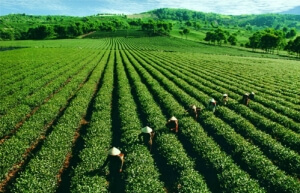
According to a report by the Vietnam Industrial and Trade Information Center (VITIC), Vietnam exported 69,000 tons of tea in January-July this year, up almost 5%, but the revenue fell by over 2% year on year because the export prices decreased by 6.6% to stand at only about $1,160 a ton.
Vietnam’s largest tea export market in this period is Pakistan with 33.7%, down 11.1% in value as the prices decreased by 9.8% year on year. The markets with sharply increased export value are Indonesia (2.1 times), Malaysia (1.8 times), the Philippines (3.5 times) and China (1.3 times).
According to VITIC, Vietnam is the 5th largest tea exporter in the world (behind Kenya, Sri Lanka, China, and India). Its major products are black tea, green tea, oolong tea, jasmine tea, and OTC black tea. However, compared with other tea exporting countries in the region, the prices of Vietnam’s tea are the lowest, equivalent to only 60-70% of the world average.
The main cause was attributed to tea quality and food safety issues. The use of pesticides for tea in many places in Vietnam is rather arbitrary.
The Plant Protection Department under the Ministry of Agriculture & Rural Development’s survey showed that up to 49% of farmers in the tea growing areas said they used pesticides with a higher concentration than the guidelines. At least 64% mixed two kinds of pesticides and 14% mixed three kinds of pesticide though they knew that the mix will increase pesticide concentration by many times.
Nearly 50% of farmers sprayed pesticide more than 7 times/season, causing waste in the use of pesticide and environmental pollution, affecting natural enemies and food safety for tea products.
The use of pesticides not certified by authorities is the main cause for the high residue of pesticides on tea products. This is why some tea shipments of Vietnam were refused by foreign partners.
VITIC said that to develop tea in a sustainable way, the State and enterprises need to pay more attention to science and technology. Tea processing establishments must create stable material areas and strictly control the use of pesticide to ensure food safety and improve productivity and quality of tea.
(source: vietnamnet.vn)

BÀI VIẾT LIÊN QUAN
Drought in Kenya is threatening the Tea Production.
Battling Cancer with Tea
Ready-to-drink Beverages increase steadily over $100 billion
India Tea Export is hurt by tensions with Pakistan and devalued Pound
Vietnam’s Tea Export Prices Half of World’s Average
Kenya: Tea Exports Down As Pakistani Sales Drop
Trade volumes up 17.7 per cent, highest in five months – KNBS
Kenyan tea glut pushes prices to multi-year lows, trade body says